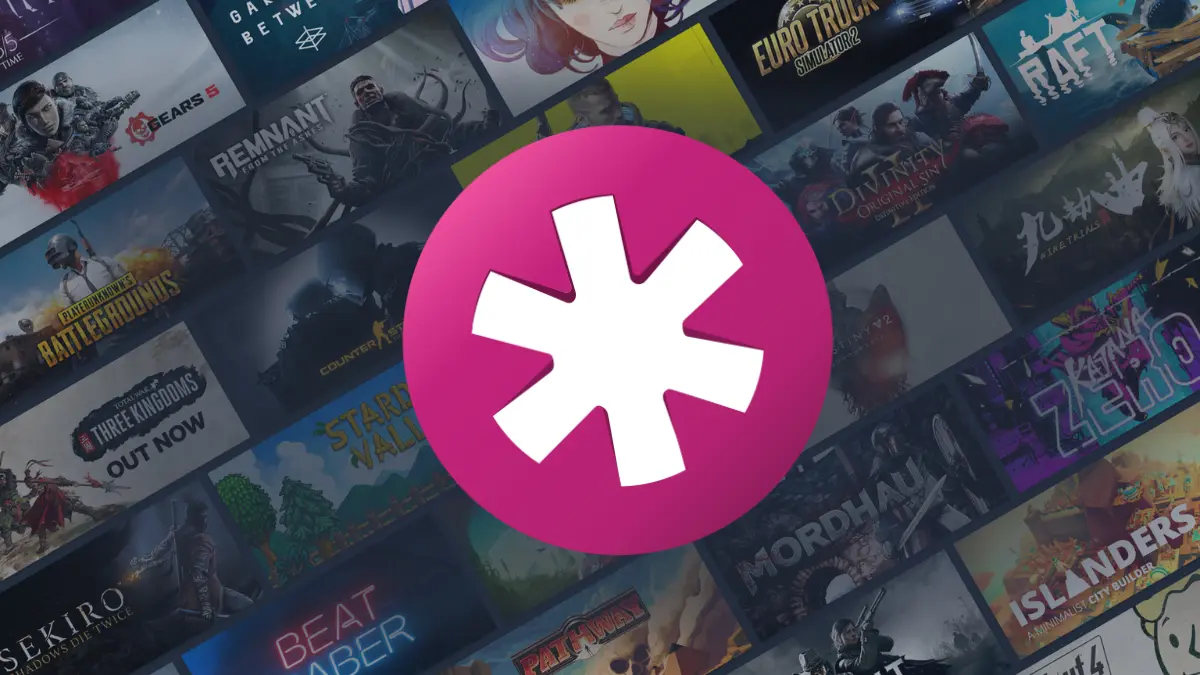On July 16, Valve updated its Steam publishing policy with a vague rule prohibiting “certain kinds of adult only content,” citing pressure from its payment processors. It then delisted hundreds of games deemed in violation of that clause.
Shortly after, a group called Collective Shout claimed responsibility, calling it a victory against some particularly depraved porn.
The move triggered massive online backlash, with thousands accusing Valve of caving to moral panic and censorship. It also led to further media censorship, resulting in multiple journalists resigning from their positions in protest.
But beyond the outrage and resignations lies a deeper, more troubling question: who gets to decide what content is acceptable in digital marketplaces—and what happens when that power isn’t wielded by platforms or lawmakers, but by unaccountable actors, from fringe advocacy groups to skittish financial institutions?
The activists claiming victory
Collective Shout is an Australian lobby and activist group that cites opposing the objectification of women as its primary mission goal. This is reflected in its full name: “Collective Shout for a World Free of Sexploitation.”
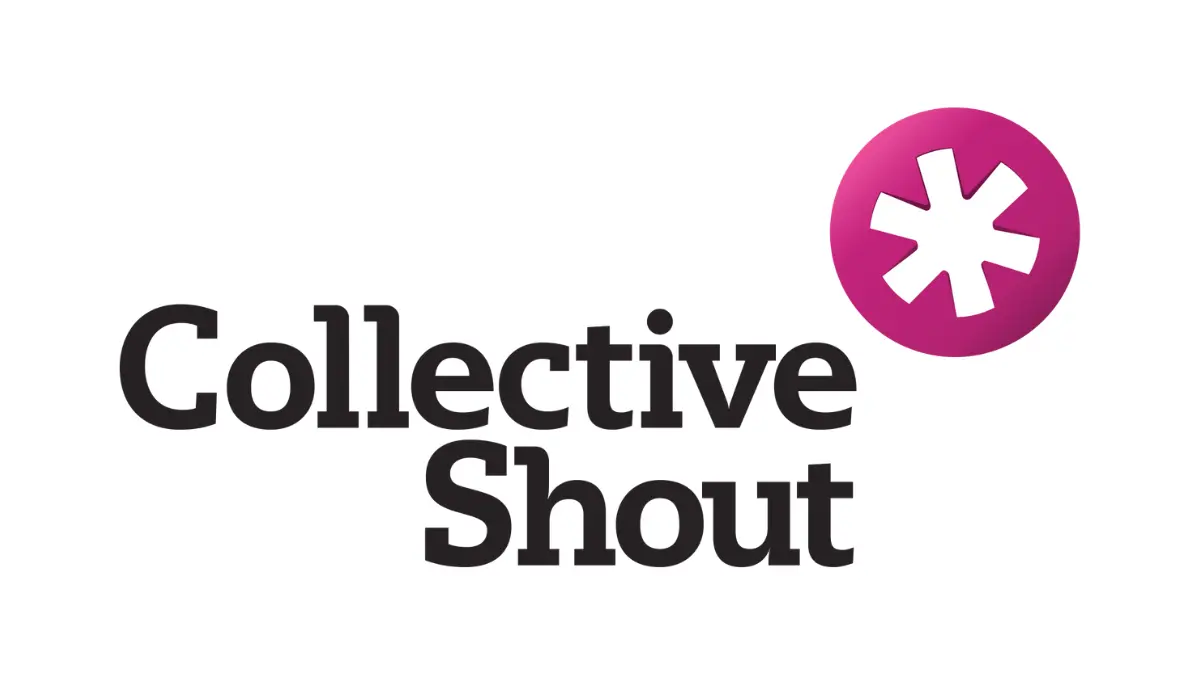
While feminism and religion aren’t the best of friends, that’s precisely the intersection of Collective Shout’s ideology, as it was co-founded by Melinda Tankard Reist, who identifies as a pro-life feminist, as strange as that might seem.
Since its 2009 beginnings, Collective Shout has engaged in many attempts to ban art and performances, some more successful than others.
It failed to ban Eminem and Snoop Dogg from touring Australia in 2014, but succeeded in preventing Tyler the Creator’s Down Under tour a year later. It then tried to get GTA 5 banned from Australia, which was a partial success, as some of the biggest retailers in the country caved to the pressure in 2015.
Three years later, Collective Shout failed to stop Detroit: Become Human sales, labeling it as a game with “child abuse and violence against women.” This was presumably a reference to Todd abusing Kara and Alice, with Collective Shout not caring that the game explicitly portrays this as a terrible thing to happen.
More recently, the group contributed to global efforts to have a game called No Mercy pulled from Steam. This might be its least controversial win to date because that game was… something. It promised things like “non-consensual sex” and the opportunity to play as “women’s worst nightmare,” both advertised right on its Steam page.
While games like that aren’t illegal in most of the Western world, Collective Shout raised enough awareness about it that the resulting outrage prompted No Mercy developers to delist it, saying they “don’t intend to fight the whole world.”
Who backs Collective Shout (and why it matters)
Though branding itself as a feminist org, Collective Shout is backed by international conservative groups, mostly driven by Christian ideology, many with broad views on morality extending far beyond gaming.
In its July 11 open letter to payment processors leading up to the Steam censorship wave, the Australian activists identified several such organizations as their undersignatories:
- National Center on Sexual Exploitation: a US conservative group whose current name makes it sound like a government org, but its former name captures the essence of its ambitions—Morality in Media.
- Coalition Against Trafficking in Women: an international radical feminist group. What’s so radical about opposing human trafficking? How you define the term: CATW rejects the distinction between forced and voluntary sex work, arguing all prostitution and porn are a form of women trafficking.
- Exodus Cry: A Christian evangelical organization that previously campaigned to shut down PornHub. It frames all porn as inherently exploitative and has called for sweeping censorship measures based on religious doctrine.
- CEASE: A British anti-porn group that advocates for strict content filtering, platform bans, and government surveillance of online adult media. CEASE positions itself as secular, but much of its backing and rhetoric aligns with Christian nationalist values.
Together, these groups represent a powerful coalition that pushes fundamentalist moralism under the guise of feminism. While their campaigns occasionally target genuinely harmful material, their broader agenda is far-reaching and seeks to reshape the internet according to a strict vision of what’s morally acceptable.
“We are an independent registered charity,” states the footer of CollectiveShout.org. But charitable toward whom?
You’d assume a feminist charity would dedicate some resources to helping real women: lobbying for stronger criminal penalties for sexual assault, giving material assistance to abuse survivors, things like that.
However, all the campaigns linked on their website are about rallying against things like video games, music, ads, Playboy magazines, and *checks notes* perfumes.
They link pornography to violence and argue games and other media inspire crime, kind of like that infamous guy who fought Wendy’s over Manhunt 2.
It’s all about imaginary victims rather than real ones, all about fighting pixels while ignoring predators—who predate video games by thousands of years.
Taking credit for Steam’s purge
On July 18, Collective Shout took responsibility for Steam’s wave of adult game delistings, arguably its loudest achievement to date.
“Since we launched our campaign calling on Payment Processors to stop facilitating payments for rape, incest, sexual torture and child-abuse themed games on Steam, they have added a new rule to their policies + removed hundreds of these games,” the group said.
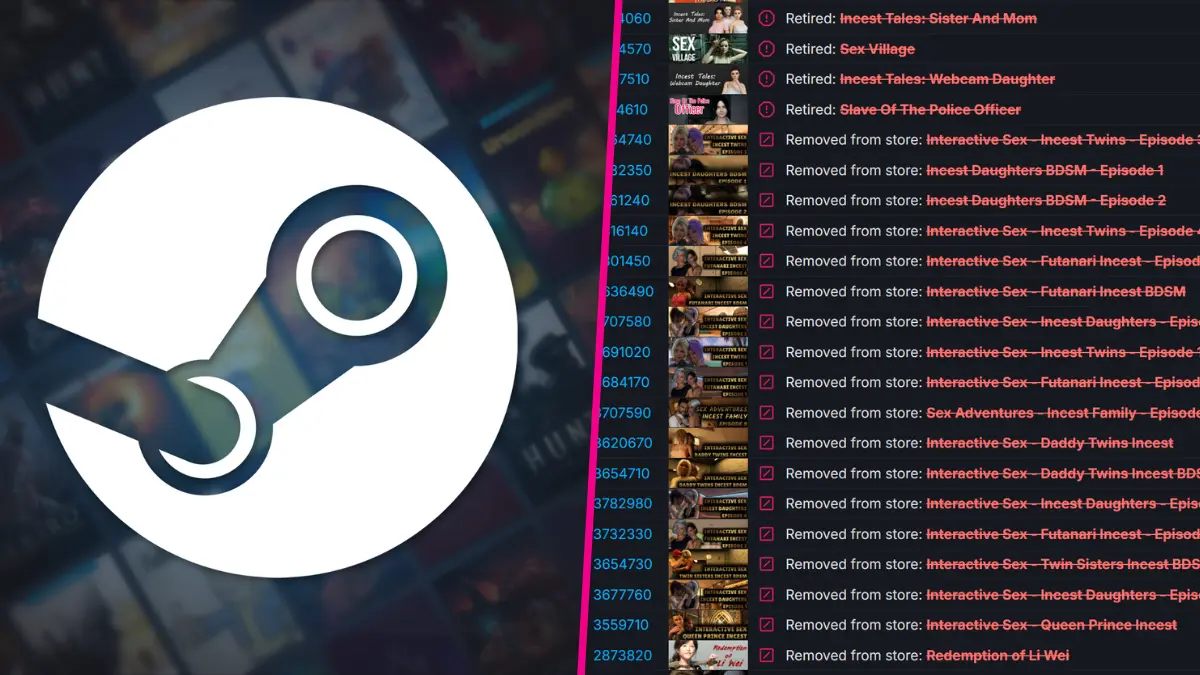
Valve later confirmed payment processors contacted it and demanded the removal of the controversial content, less it wanted to lose the ability to receive money.
Steam’s vague new rules
The new Steamworks rule resulting from this event is as vague as they come, stating that Valve prohibits “content that may violate the rules and standards set forth by Steam’s payment processors and related card networks and banks, or internet network providers.”
Only six more words are used to expand on this description: “certain kinds of adult only content.” Since this doesn’t exactly narrow it down much, I tracked down those underlying payment processor policies to see if they can do better.
The latest version of Visa’s policy from April 2025 contains no explicit mentions of adult content restrictions. There are references to “high-integrity risk” merchants, but only in the context of Visa potentially demanding more precautions in order to do business with them.
There are also provisions stating Visa may decline working with any company it deems too big an integrity risk. Of course, this is its right as a business, but it doesn’t exactly help figure out how it judges content, assuming there’s any rhyme or reason to it at all.
MasterCard is refreshingly more blunt about this, saying it disallows any transaction that might be damaging to its reputation, and that what constitutes damaging is in its “sole discretion” (section 5.12.7 of its rules, last revised in June 2025).
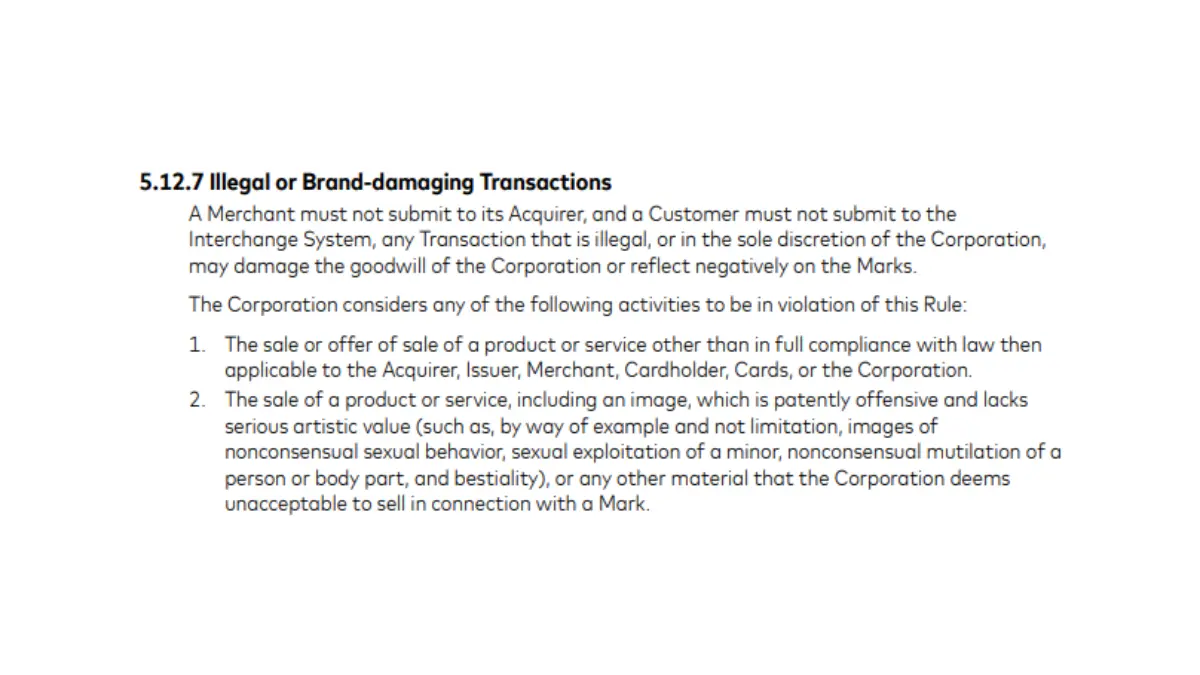
So, Valve is citing payment processors, and payment processors are citing a case-by-case policy that boils down to “we’ll make it up as we go,” assuming they cite anything at all.
Mastercard responds, but doesn’t take the blame
On August 1, Mastercard finally responded to the controversy—sort of. The company denied directly ordering any game bans, claiming it “has not evaluated any game or required restrictions,” and that it only enforces policies against illegal content.
But Valve tells a different story. In a statement to Kotaku, the company said payment processors—citing Mastercard’s Rule 5.12.7—rejected Steam’s adult content policy. That rule gives Mastercard broad discretion to block transactions it feels could hurt its brand, even if the content is legal.
So while Mastercard may not have pulled the trigger, it definitely handed Valve the gun.
What games actually disappeared
These rules, defined with the precision of a magic 8-ball, were apparently the basis for pulling over 400 adult titles from Steam, by Collective Shout’s own count. “We counted almost 500 games tagged with rape and incest on Monday and, at our last count, there are 82 left,” the group said on July 18.
For clarity, neither of those tags have ever existed on Steam. However, the words themselves can be included in product descriptions. As of July 31, there are still 67 Steam games that fit this description: 49 titles reference “rape” and 18 mention “incest” on their pages.
Third-party tracker SteamDB has also confirmed that “many” adult games were removed from the store due to the July 16 policy change, aligning with Collective Shout’s claim. So, although the full list of these games doesn’t exist (yet), Collective Shout’s removal count estimate checks out.
Itch.io joins Steam’s NSFW content censorship
A few days after Steam started its NSFW content purge, Itch.io did the same, also citing payment processor pressure. Its initial response looked even more drastic, as it deindexed all adult content from browse and search pages.
The company said this was because of the open nature of its platform, which allows anyone to publish anything at any time. As such, it needs to manually review its adult content instead of immediately knowing what to crack down on, like Valve did thanks to its pre-screening.
PayPal Joins Steam Censorship Wave
On August 12, Steam announced dropping PayPal support for all but a handful of currencies. As of now, only USD, CAD, AUD, EUR, GBP, and JPY still work for PayPal transactions on the platform.
According to the current version of Steam’s “Purchasing Issues” FAQ page, it was actually PayPal doing the dropping here. One of its acquiring banks started automatically terminating all Steam transactions in most currencies in early July 2025.
Social media reports suggest that Steam immediately discontinued PayPal payments for the affected currencies. However, it took weeks for Valve to actually come clean about doing so.
The company says it’s working to restore the suspended functionality but is “uncertain” when it might see results. In the meantime, it’s exploring additional payment methods for those affected.
In a later statement to RPS, Valve confirmed the issue “is regarding content on Steam, related to what we’ve previously commented on surrounding MasterCard.” In other words, it can be tied back to the Collective Shout campaign.
Though the statement name-drops MasterCard, the payment processor isn’t to blame here, as it doesn’t fit the description of an “acquiring bank,” which is the term PayPal used. An acquiring bank handles card payment transactions from a merchant like Steam, then routes them through a processor like Visa for authorization and fund transfer.
PayPal isn’t in the habit of advertising the banks it’s partnered with, making it difficult to make an educated guess who may be responsible for the issue. Based on the list of currencies still supported for PayPal transactions on Steam, it’s possible that the culprit isn’t based in North America, Europe, Australia, or Japan.
While that does narrow things down geographically, there are still plenty of merchant acquirers operating in other parts of the world. And the initial assumption might still be wrong—PayPal could very well be using, say, a U.S.-based company to handle payments in Asia. It’s just less likely than a partnership with a local bank.
To make things even more absurd, PayPal continues to work on G2A and other key resellers that support it. So, you can technically still use it to buy a Steam game with something like Brazilian real—you just have to pay for a key that might have originally been purchased with a stolen credit card.
How gamers and devs are reacting to the censorship wave
The online backlash to the censorship wave has been immediate and immense. Collective Shout seemingly had enough abuse hurled at it to private its Twitter account.
In two weeks, a Change.org anti-censorship petition got nearly three times as many signatures as Collective Shout’s censorship one did in four months.
Meanwhile, Steam users have reportedly complained to payment processors so much that customer support reps are now preemptively asking whether they’re calling with a Steam or Itch.io censorship complaint.
I was unable to verify this claim by calling Visa’s EU customer service on July 31. So, if it’s indeed happening, it’s not a global policy.
Apart from Steam users being upset about a small Aussie group getting to police their content, developers working in adult genres have also expressed concerns over recent developments.
Complying with local laws still puts them at the mercy of payment processors’ make-it-up-as-you-go policy, and they’re potentially risking getting their games delisted and losing their livelihoods with no recourse.
The world’s largest game dev membership nonprofit, the IGDA, has also weighed in on the issue. It called for greater transparency in how content is policed, complete with clear guidelines and an appeals process.
The IGDA didn’t directly oppose the censorship itself. Instead, it implied that extra rules beyond legal requirements are acceptable, as long as they’re clearly presented and consistently enforced.
The slippery slope of payment processor censorship
As third parties with little accountability or public scrutiny, payment processors already play a major role in shaping global entertainment policy. Letting them gain even more influence on this front is starting to look like an increasingly slippery slope.
The issue of accountability
In an ideal world, whether Steam should allow fetish content and to what degree should be up to local laws first, Valve second, and no one else third. Not some unchecked payment processor acting like the government of the world, and certainly not fringe groups pushing them to do so from the shadows.
If your elected representatives pass a law banning certain content from Steam, you have options: vote for them in the next election if you agree, vote against them if you don’t, or ignore it if you’re indifferent or not a single-issue voter.
Likewise, if Valve bans certain content, you can continue using Steam or take your business elsewhere if you feel so strongly opposed to such a move.
Both of those scenarios are examples of accountability, something that a group like Collective Shout simply doesn’t have. No matter how reasonable their beliefs might sound, unaccountable third parties shouldn’t be policing global entertainment on platforms they aren’t even connected to.
When morality policing replaces democratic oversight
Targets also tend to shift. Today, it’s fringe fetish content. Tomorrow, it could be all adult content.
And when it comes to religious fundies, they tend to classify any whiff of LGBTQ+ themes as “adult content.” Historically, that’s been with the goal of getting such topics banned from schools, but having it pulled from Steam is a much bigger win because it’s global.
See where this is going? If I’m a religious activist who just got porn and LGBTQ+ themes banned from Steam, I now a) feel emboldened and b) have plenty of free time. Why stop now?
Why not keep fighting the good fight and go after even more content my religion disagrees with? Hey, God is on my side, he clearly helped my crusade so far!
In all seriousness, the games I managed to confirm were removed as part of Collective Shout’s campaign are mostly things that I personally never would have allowed on Steam in the first place. I haven’t seen any No Mercy-level sicko simulator, but some came quite close.
I fully understand and agree with people being appalled by them. But the thing is, I don’t think it’s me who should be calling the shots. I also haven’t found anything illegal removed either.
Games are full of content that’s illegal IRL
Incest is illegal, but incest video games are not. Murder and speeding are also illegal, but games where you get to murder people and participate in street races aren’t. So, where do we draw the line, and—more importantly—who gets to draw it after laws are already in place and doing their prevention thing?
With that in mind, I’d much rather see a group of Karens like Collective Shout burn money on fighting a never-ending battle against legal fetish porn than free up enough resources to start thinking about what else they could get banned, because the list of things they object to is long.
The underlying logic isn’t particularly consistent, either, as highlighted by that failed Detroit: Become Human campaign from 2018. Hey, the Bible has child abuse and violence against women, and unlike Detroit: Become Human, it doesn’t even always present them in a bad light—how come no one is rallying to ban it, or at least censor that super sus Old Testament?
To be clear, every ideology has inconsistencies if you look hard enough. But that’s precisely the argument against having any single small group govern global entertainment that’s already regulated by various laws.
Why Collective Shout isn’t the real problem
To zoom out a bit, Collective Shout didn’t invent this kind of censorship. At best, they knocked on a door that was already ajar.
The real choke point is payment processors being skittish about anything vaguely adult ever since the U.S. FOSTA-SESTA laws made platforms legally liable for user-uploaded sexual content in 2018.
After Visa got dragged into a lawsuit over Pornhub and MindGeek, it now treats anything involving sex as a legal risk. It’s likely not a coincidence that Tumblr’s adult content purge and OnlyFans’ short-lived attempt to do the same both happened after the FOSTA-SESTA laws. In both of those cases, payment processors stepped in as de facto censors.
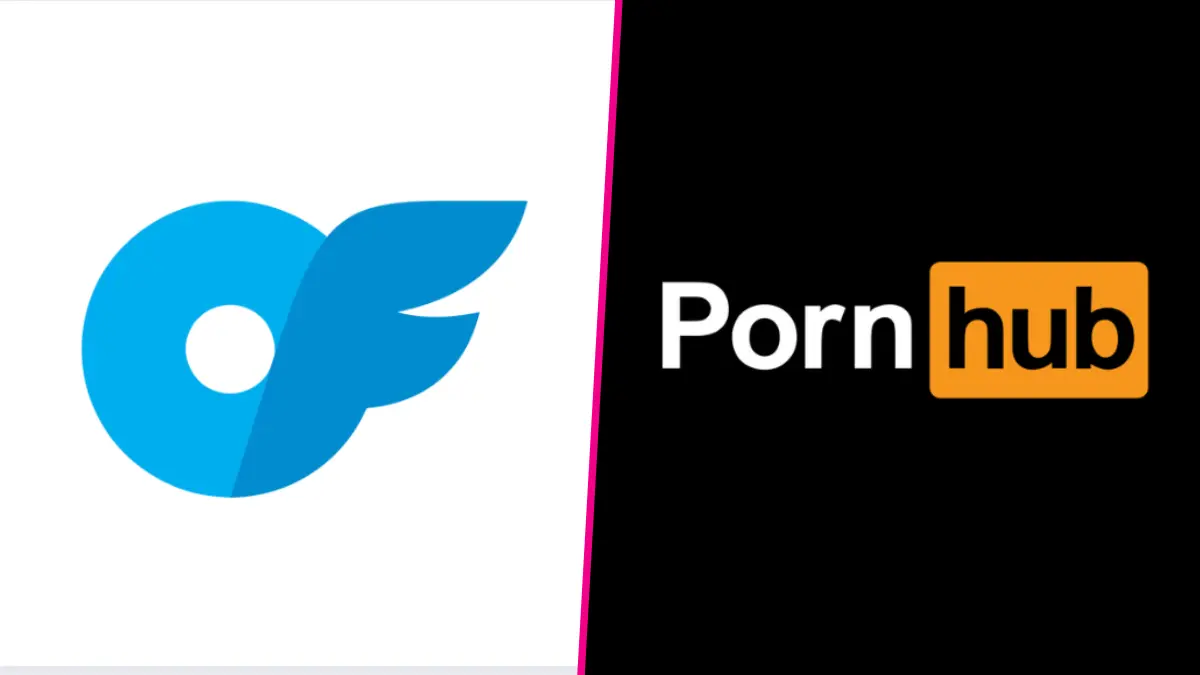
It bears repeating: video games are not real life. Sane adults can distinguish between fiction and reality.
While the porn industry is rife with human trafficking and other forms of exploitation, developers aren’t held against their will and forced to make adult games, unless you count crunch.
These games aren’t harming real people. And if the argument is that they turn players into sexual deviants, then where are all the criminals trained by GTA?
That’s not to say payment processors can’t grasp this level of nuance. They probably do. But to them, it’s likely not worth the reputational risk.
None of this would be a problem if Visa and MasterCard didn’t hold a duopoly over global payments. But they account for 90% of payment processing outside of China.
For now, they’d be all too happy to let Collective Shout take all the heat here. But while their moral crusade helped spark the fire in this instance, it’s not what’s keeping the censorship flames going.
What happens next
Looking ahead, several things seem likely to happen: more scrutiny, limited platform changes, and possibly some game relistings.
Itch.io is looking for new payment processors who are more comfortable with adult content. This is basically what adult video sites already use, paying a premium for specialized companies to handle their transactions. And with Stripe already turning them down, things aren’t looking great.
This almost certainly won’t be what Valve does. Steam has over 130 million users across every continent, even Antarctica. Visa and Mastercard are the only realistic options at that scale. PayPal and similar services aren’t true alternatives either, since most users still fund them with cards from the big two.
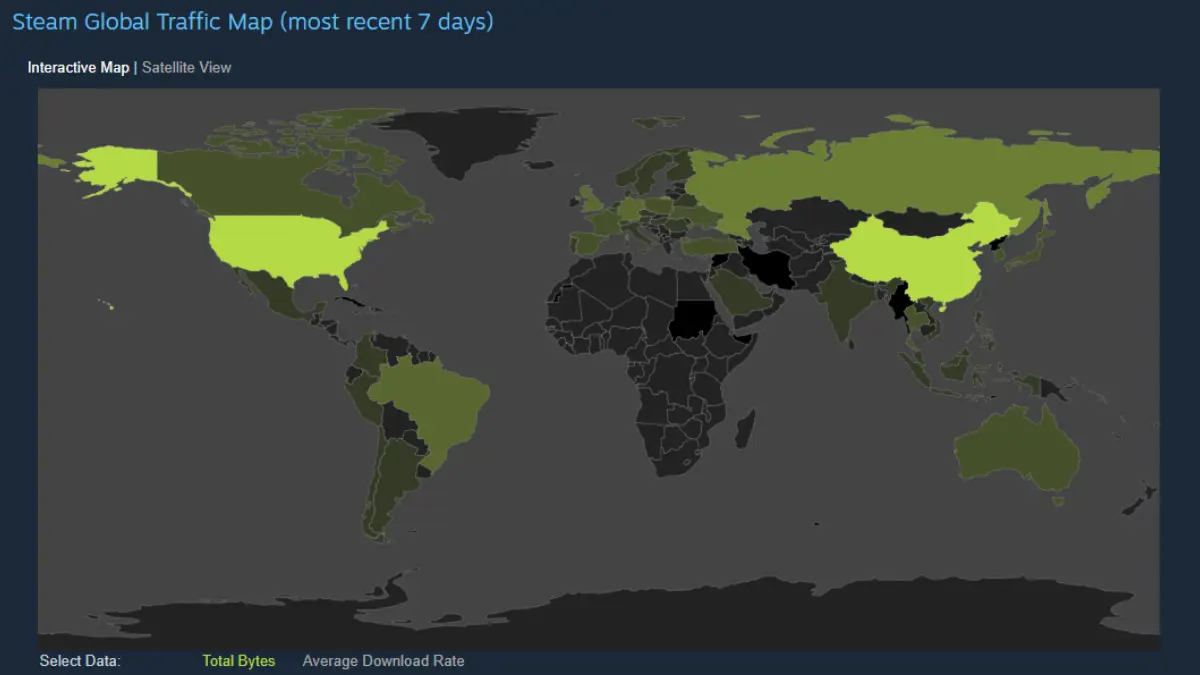
As for policy reform, there’s a slim chance the backlash pushes payment processors to clarify their partner content guidelines. But don’t hold your breath.
The vague language in their terms is the point, as it gives them total discretion while avoiding legal liability. They’re private companies, and as of right now, no one’s forcing them to process payments they don’t want to.
That said, one U.S. bill could change that. Called the Fair Access to Banking Act, it was introduced in February 2025 and referred to the Senate Committee on Banking, Housing, and Urban Affairs.
Its Section 5 prohibits payment processors from denying services to anyone who isn’t breaking any laws, which would offer real protections for devs and users caught in the crossfire of moral lobbying.
The bill remains with the Senate committee as of today and has yet to reach the House floor. Again, don’t hold your breath, but that’s another thing that might gain traction due to this ordeal. If you’re from the U.S. and want to help with that, call your rep.
The real issue is power, not porn
Overall, this whole drama isn’t about one banned game, or even 400 of them.
It’s certainly not about being for or against some disturbing or tasteless adult content, though Collective Shout would love to frame it that way because almost no one’s lining up to champion the return of seduce-your-sister type of games on Steam. I mean, eww.
No, this is about who gets to decide what you’re allowed to play in addition to your local laws and game stores. And right now, the answer isn’t you.
